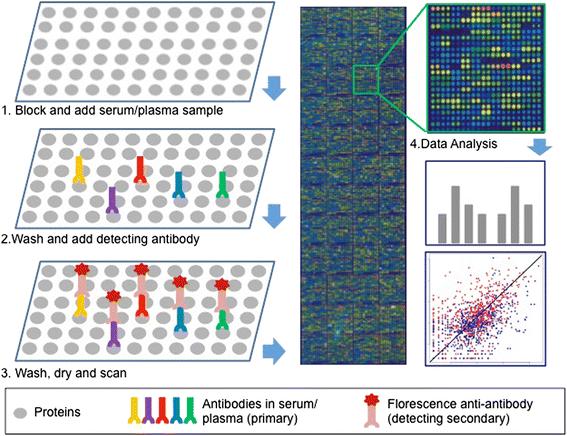Protein Microarray Analysis Service
Protein microarray is a high-throughput protein function analysis technology with fast and accurate analysis simplifying and advancing protein research. Creative Proteomics provides professional and high-quality protein microarray analysis services to facilitate your protein research with years of protein research experience.
What is Protein Microarray
Protein microarray (or protein chip) is a high-throughput method for protein detection and function studies. There are two kinds of protein microarrays, antibody microarrays and functional protein microarrays. Antibody microarray has grown to be one of the most powerful multiplex detection technologies. While functional protein microarray is more often applied to the study of protein interactions and functions. With the development of technology, these two kinds of protein microarrays have greatly improved in speed, sensitivity and specificity, etc. It is possible to detect proteins qualitatively or quantitatively using protein microarrays with high throughput, or to expand the scope and depth of protein research by combining them with MS. Protein microarrays can be used for a variety of protein analyses, such as:
Protein microarrays excel at quantitative analysis, enabling researchers to measure protein expression levels in multiple samples simultaneously. It can also be mutually validated with MS, which is invaluable for protein quantification.
Protein microarrays can accurately identify specific proteins in complex mixtures. Through specific binding, it can exclude interferences and rapidly identify proteins, which is critical for rapid and accurate protein identification.
Protein microarrays are powerful tools for studying protein-protein interactions. It contributes to unraveling the intricate web of molecular connections in biological systems and reveals important cellular processes.
PTM Analysis
Protein microarrays can also be used for in-depth studies of post-translational modifications, which are essential for understanding protein function. Using protein microarrays, the complex modifications that proteins undergo can be explored.
The Principle of Protein Microarray
Protein microarrays use specific molecular interactions to detect proteins, such as antigen-antibody interactions and protein-protein interactions. Protein microarray immobilizes known proteins (antigens, antibodies, receptors, ligands, cytokines, etc.) on a solid-phase carrier and captures the proteins that specifically bind to them in the sample. After elute, the captured proteins were identified and analyzed. Protein microarrays can analyze proteins both qualitatively and quantitatively, and in conjunction with MS can greatly improve proteome coverage.

Fig 1. Schematic of protein microarray
Our Service
Creative Proteomics takes pride in offering meticulous and top-tier protein microarray analysis services, encompassing both quantitative and qualitative analyses of proteins. Furthermore, we have the capacity to seamlessly integrate protein microarrays with MS analysis, thereby elevating the scope and depth of your protein research endeavors.

Fig 2. Protein microassay workflow (Yuan J, et al., 2016)
Applications of Protein Microarray
Protein microarrays can qualitatively or quantitatively detect proteins at high throughput, and it is a powerful tool for protein quantitative analysis, protein identification, protein interaction analysis, post-translational modification and other research. It has wide applications in biomarker detection, disease diagnosis, drug targeting and medical research, etc. Meanwhile, it can be used in conjunction with MS to improve the breadth and depth of protein research. Protein microarrays provide researchers with a versatile tool for exploring the complexity of proteins and their role in health, disease, medicine and drug, etc.
Advantages of Protein Microarray
- It requires very low sample volumes and does not require complex sample processing.
- It has high-throughput analysis capabilities and can analyze proteins in large numbers of samples simultaneously.
- It's very easy to use and very accurate.
- It can be used for a variety of protein analyses and has a wide range of applications.
Creative Proteomics is your go-to provider for high-quality proteomics analysis services. If you are interested in protein microarray analysis service, please contact us. We look forward to discussing the specifics of how we can assist you in your research pursuits.
References
- Neagu M.; et al. Protein microarray technology: Assisting personalized medicine in oncology (Review). World Academy of Sciences Journal. 2019, 1: 113-124
- Yuan J.; et al. Immune Monitoring Technology Primer: protein microarray ('seromics'). Journal for ImmunoTherapy of Cancer. 2016, 4(1): 2

